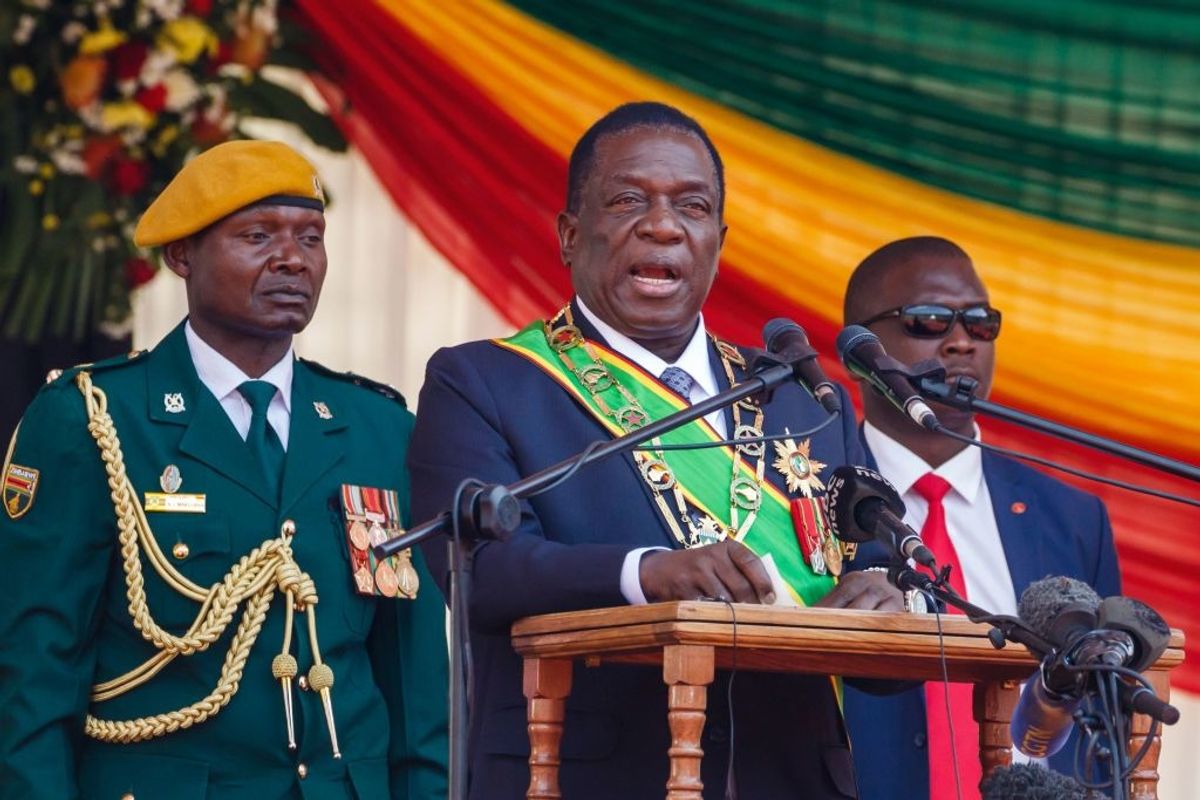Zimbabwe Announces "Patriot Bill" Amidst Rising Human Rights Protests
The Zimbabwen government has announced that it will table the "Patriot Bill" in parliament which will criminalise openly criticising the government.

Zimbabwe's President Emmerson Mnangagwa speaks during the Defence Forces Day celebrations held at the National Sports Stadium in Harare on August 14, 2018.
ZImbabwean government, led by President Emmerson Mnangagwa, has reportedly announced that a new bill called the "Patriot Bill" will soon be tabled in parliament. According to TIMESLive, the "Patriot Bill" is set to criminalise any communication with foreign embassies that take place without government clearance. Additionally, public critique and oppositional demonstrations will also be illegal under the bill. This announcement follows increasing criticism at the Zanu-PF led government for corruption, human kidnappings and other grievous human rights violations.
Read: #ZimbabweanLIvesMatter: Here are Their Personal Stories
Parliamentary Affairs Secretary, Virginia Mabhiza,stated that the basis of the "Patriot Bill" is founded on "promotion and protection of national interests".
"Conduct such as private correspondence with foreign governments or any officer or agent thereof will be prohibited, including false statements influencing foreign governments, or any other such conduct aimed at undermining the country," Mabhiza explained to The Zimbabwe Mail.
UK ambassador to the World Trade Organisation, Julian Braithwaite, has critiqued the Zimbabwean government for the manner in which it treats civilians. In an official public statement, Braithwaite scathed the government and urged for the inclusion of respect for human rights as part of Zimbabwe's economic reforms.
The economic struggles of the country seem far from being resolved and critique of the government from international countries and agencies seems to fall on deaf ears. Mnangagwa has consistently denied a crises, while regional bodies SADC and AU have done nothing but watch. Public criticism grew after the July 31 protests which allegedly culminated in the arrest and kidnappings of civilians. The unlawful incarceration of journalist Hopewell Chino'ono and oppostional party leader Jacob Ngarivhume sparked global outrage through #ZimbabweanLives Matter. The two were released after mounting public pressure.
Zimbabwe is not the only country to deliberate on laws that infringe on human rights of public speech and freedom of association. Tanzania, Ethiopia, Sudan and Ivory Coast have also indicated passing similar laws.
- Former Botswana President Ian Khama Condemns Zimbabwe's ... ›
- SADC Meeting Leaves Zimbabwe Crisis Off African Union Summit ... ›
- #ZimbabweanLivesMatter: Calls for African Union to Respond to ... ›
- #Zimbabwean Lives Matter: Here are Their Personal Stories ... ›
- Zimbabwe's Open Wound: Why Zimbabweans Are Still Protesting a ... ›
- Zimbabwean Police Are Using Violence to Disperse Peaceful ... ›
- Prominent Zimbabwean Journalist Hopewell Chin'ono Arrested By ... ›
- Zimbabwe Journalists Under Siege Amid Escalating Protests ... ›
- The Zimbabwean Government Plans to Restrict Social Media Use ... ›
- Zimbabwe Approves Law Which Will Criminalise Anti-Government Protests - OkayAfrica ›
- Zimbabwe Arrests Opposition Party Members For Flash Demonstration - OkayAfrica ›
- History in Motion as First African Woman to Head the WTO - OkayAfrica ›
- History in Motion as First African Woman to Head the WTO - OkayAfrica ›

